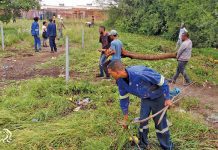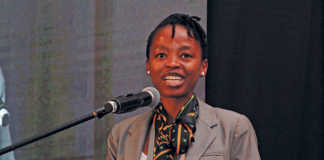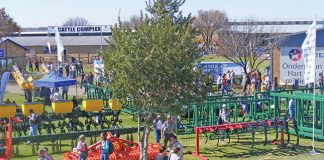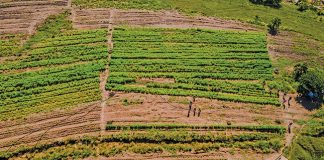Sanddraai Arbeidsgenot started with 57 shareholders in 2002, and now has 45. From left to right are Hendrik Pofadder, David Boontjie, Johannes Fourie, Jacobus Scheefers, Willem Block, Piet Mere and Paul van Rooy.
Having realised a profit of 38% on their vineyards over the past three years, Sanddraai Arbeidsgenot (90ha) is a BEE farming project that works. “Unless the Lord builds the house, its builders labour in vain,” is the team’s motto, taken from Psalm 127:1. “And it was by the grace of God that we got funds from the department of rural development to buy Arbeidsgenot in 2003,” explains commercial farmer Johannes Fourie from Groblershoop in the Northern Cape.
Johannes and his son Willem-Cobus are successful commercial farmers who produce grapes for the wine and raisin industries, pecan nuts, lucerne and livestock on their farms Sanddraai and Opwag, where a total of 105ha are planted to grapes, 30ha to lucerne and 30ha to pecan nuts. They also keep cattle and sheep on 5 000ha on Sanddraai.
The Sanddraai Arbeidsgenot Company was created in 2002. Also formed at the same time were the Genade Trust for the workers and the Fourie Family Trust. The workers own 75% of the shares in Sanddraai Arbeidsgenot and the Fourie Family Trust owns 25%. The board of directors consists of Johannes and three farmworkers.
“Remuneration for the shareholders is based on experience and years of service, equal dividends and annual bonuses. The directors and foremen decide on the bonuses. These are paid out after the grape harvest and in December. We try to put around R200 000 aside each year for this,” says Johannes.
Shareholders weren’t allowed to sell shares within the first three years. The company started with 57 shareholders, but now has 45. “We should’ve limited the shares to people who worked at least five years or more on the farm, and it’s a shame we’re left with relatively few people prepared to take ownership of the project,” says Willem Block, one of the company’s directors.
“But we remain positive because we’ve achieved a lot over the past eight years.” “Some of the shareholders had unrealistic expectations. We bought an under-developed farm and we still use a significant percentage of our funds for development. For example, we borrowed R250 000 from FNB to establish a pecan nut plantation. We paid our last instalment this year. Some of the shareholders would rather have had the money in their pockets.”
A successful farming project
Sanddraai Arbeidsgenot’s success lies in prayer, cooperation, communication and strict financial discipline. “We start every day with prayer and a scripture reading. Joint decision-making is of utmost importance. We depend on the success of the venture for our livelihood, and all shareholders therefore have a say in running the company,” says Johannes.
“Communication is equally important. We start every working day with a meeting where we plan the activities for the rest of the day. Financial discipline isn’t negotiable. We must account for all income and expenses, and every ton produced on the farm.” “Don’t eat the seed,” adds Willem. “Reinvestment in the land is crucial to ensure economically sound expansion and development.”
Skills training for the shareholders is another priority. Tractor maintenance, welding and vineyard pruning are some of the courses they’ve completed, while others have also been trained as primary healthcare workers. “Instead of loving the people and ruling over the land, our country used to rule over the people and love the land. This must change,” says Johannes.
Planting the right cultivar
A total of 22ha has been planted to vineyards so far, all of which are under drip irrigation from the Gariep River. This includes 6ha of Villard Blanc, 6ha of Colombard, 6ha of Merbein and 4ha of Merlot. Some 525t of grapes were produced in 2010, including 36t/ha of Merbein. The Merbein is supplied to Safari Dried Fruit for the raisin market and the rest of the grapes to Orange River Wine Cellars. The Colombard yielded 30t/ha and Villard Blanc 38t/ha.
“We planted the first Villard Blanc three years ago. This cultivar isn’t prone to downy mildew and white rust,” says Willem. “There’s a premium on Merlot. We received about R1 000/t for the other cultivars, while the Merlot went for R3 000/t. We work on a cash basis and don’t have to pay interest on loans, and this impacts positively on our financial success rate.”
As for their pecan nut orchards, Johannes and Willem expect a reasonable harvest for the first 4ha this year and anticipate yields of at least 900kg/ha pecans nuts. Pecan nuts trade for about R25/kg and Johannes believes they’re more profitable than citrus and dates. “Dates are easily damaged by rain and are too labour-intensive, while citrus is prone to frost damage,” he explains.
“Input costs for pecans are about R25 000/ha and it takes up to six years before the trees start bearing fruit. So we need a cash crop for that period to ensure a sound cash flow, hence the lucerne. Our long-term goal is to replace the lucerne with vineyards.”
Sanddraai Arbeidsgenot’s success is also evident in that houses were built for the shareholders and some of them receive R3 000 a month. “This venture has changed my life”, says Willem. “When I walk around on the farm I’m proud and thankful to think this is mine. However, it’s no use receiving land when you don’t have the expertise. We have practical farming skills, while Johannes has managerial skills. We complement each other.”
Call Willem Block on 079 974 2375, or Johannes Fourie on 082 785 0626.













